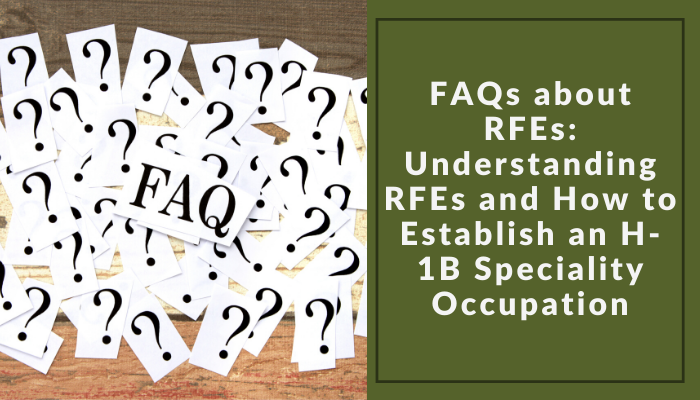Part 3 of this series answers the final FAQs about RFEs, particularly as they relate to specialty occupations H-1B petitions. Read parts one and two.
5. How do we establish that the position is a specialty occupation?
The petition must demonstrate to USCIS’ satisfaction that the position is one that requires not only the understanding and application of a highly specialized body of knowledge but also that the employer and the industry normally require at least a bachelor’s degree or its equivalent in a particular specialty field, not a general field of education.
In recent years, USCIS has significantly narrowed its interpretation of a specialty occupation, requiring extensive evidence and links between the work to be performed, the background of the employer, the educational requirements for the position, and the foreign national’s education.
There are four qualifying criteria to establish that the position is a specialty occupation:
- The position requires a Bachelor’s Degree at a minimum
- A Bachelor’s degree is the common entry-level requirement for the industry
- The employer normally requires a Bachelor’s Degree or its equivalent
- The nature of the specific duties is so specialized and complex that the position requires a
Bachelor’s degree
There is specific evidence to establish each qualifying criteria. We strategize with our clients as to which criteria and evidence are most applicable and beneficial to the particular case.
6. What evidence will you require from us to help us respond to the specialty occupation RFE to establish that a Bachelor’s degree is normally the minimum requirement?
This evidence includes:
Documentation Showing the Nature and Complexity of the Employer’s Business and H-1B Position. This evidence includes responses to requests for proposals, marketing and business plans, brochures, technical specifications, contracts, agreements, statement of work orders, invoices, budgets, project timelines, job site photos, news articles, and others. The goal is to further show how the position fits within the needs of the employer’s business and to establish the complexity of the business and position.
Very Detailed Project(s) with Duties Breakdown and Educational Requirements. This includes an extremely detailed breakdown of each job duty with specific tasks performed as part of each job duty and explanations as to how the beneficiary’s education (specific coursework) is used and necessary to perform the duties. The goal is to tie each duty to the beneficiary’s courses in the specific field.
Employer’s Hiring Practices. This includes evidence of educational documents (diploma, certification, resume/CV, degree verification record, background information) of workers who previously or currently occupy the H-1B position or similar and have the same or closely related degree as the beneficiary. This also includes evidence of the hiring of these workers (W-2, pay records, performance evaluation, benefits summary). Additionally, it includes organizational chart(s) showing the employer’s hierarchy and staffing levels, and how the offered position fits within the organization’s structure (to illustrate the multifaceted nature of the position).
Industry Requirements (Similar Employers). This evidence includes establishing primarily through letters from seasoned professionals (such as HR Directors, Managers, Principals) that similar employers in the field also require a bachelor’s degree in the specific field when they hire for similar positions. This can also include: documents or letters from an authoritative career source or industry association, job advertisements/postings, and/or online bios or background information for similar positions by other
employers in the field that require at least a bachelor’s degree in a specific field.
Third-Party Expert Opinion. This includes one or more opinion letters from a subject matter expert in the relevant field – usually an experienced university professor with credentials to provide this opinion. The expert letter includes an analysis of the position’s duties and supports the requirement of a bachelor’s degree or higher in a specific field.
We engage experts that also discuss the employer and its particular business and specifically focus on analyzing the detailed position job duties and establish, based on the expert’s experience and knowledge of the industry, that the duties are consistent with having a bachelor’s degree in a specific field (or narrow list of fields).
Download a PDF of the Full FAQ Series
Need assistance with RFEs? Contact Giselle Carson and the Marks Gray Immigration Team.
